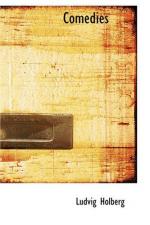Erasmus Montanus seems at first sight a mere farce, in which the author ridicules academic pedantry and the vapid formalism of logic as once taught at the University of Copenhagen. But it is much more than that. Holberg gives us a memorable series of genre paintings of Danish life of his day, and at the same time presents a situation of universal interest. Erasmus is a prig who has adopted some new ideas, not so much from righteous conviction as from the feeling that they will give him intellectual caste. His revolutionary theories raise an uproar in the village. Each apostle of the old order opposes them in his characteristic way, and Erasmus has not enough real faith within himself to prevail against the combined attacks of the Philistines; he renounces with oaths the assertions that the world is round. Still, there is nothing tragic in his renunciation, for we feel that he is as great a fool as any one in the play. Erasmus Montanus is a pure comedy, in which the author’s humor plays freely upon all the figures in the drama; and it is just because the characters rather than the action absorb our interest that we do not regard it as a farce. Professor Vilhelm Andersen correctly described it as a “Danish culture-comedy of universal significance.”
Holberg is often called the Danish Moliere. It is true that he learned many lessons of technique from the great trench dramatist, and borrowed freely and often from his work; but he differs from Moliere both in the quality of his humor and in the spirit that animates his critical view of life. He might as justly be called the Danish Plautus, or the Danish Spectator. The truth is, not only that Holberg possessed a profoundly original comic spirit, but also that his work is clearly related to many dramatic and literary traditions besides those of French comedy, notably to the commedia dell’arte, and the essays of The Tatler and The Spectator. Out of these various and diverse elements, nevertheless, he contrived to construct dramas at once original and national.
In a large sense, Holberg’s comedies arc closely related to the rest of his work. His treatises, histories, essays, satires, and comedies are all diverse expressions of one definite purpose. Holberg’s early life and natural cosmopolitan interests made him a citizen of eighteenth-century Europe, as a whole, and he strove steadily to bear the intellectual light of that urbane age to his native country, then backward in culture. Holberg—professor, scholar, and philosopher—seized with avidity the opportunity to write comedy, not from a desire to display his own versatility, or from an absorbing devotion to the drama as a form of art, but because he believed that through his plays he could fulfil most completely what he conceived to be his intellectual mission.
Oscar James Campbell, Jr.
May 20, 1914




